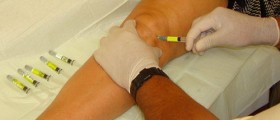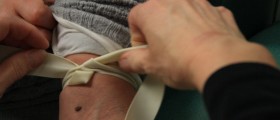
Menopause symptoms, such as hot flashes and vaginal dryness, burning and itching in some women may have to be treated with estrogen replacement therapy (also known as hormone replacement therapy, HRT). Besides menopause, the same treatment can be used to treat low production of estrogen in young women, some abnormal vaginal bleeding due to hormone problems or symptoms caused by prostate cancer in some men. The most common forms of estrogen injections are estradiol valerate and estradiol cypionate, as well as conjugated estrogens.
How to Use Estrogen Injections?
Both estradiol valerate and estradiol cypionate are liquids that should be injected into a muscle. Since these hormones have long duration, it is usually enough to take them every 3 to 4 weeks, while for the treatment of prostate cancer they should be used in intervals of 1 to 2 weeks. Hot flashes usually get better several days after the first injection, but if this does not happen, inform your doctor.
Conjugated estrogens commonly come in powder form and, therefore, have to be mixed with some sterile water and then given into a muscle or vein. These can be given as a single dose and another dose can be injected 6 to 12 hours after the first one, especially if the treatment is prescribed for abnormal vaginal bleeding.
Precautions regarding Estrogen Injections
Some people may be allergic to estrogen injections or some of ingredients in these injections. These patients must not use estrogen drugs.
Make sure to inform your doctor and pharmacist about all prescription and non-prescription drugs and remedies you have been taking. Do not neglect to tell them about vitamins or some nutritional supplements you use, including remedies made of St. John’s wort.
Some medications may interact with estrogen injections like amiodarone, some antifungal drugs (itraconazole and ketoconazole), then aprepitant, carbamazepine, cimetidine, clarithromycin, Cyclosporine, dexamethasone, diltiazem , erythromycin, fluoxetine, fluvoxamine, griseofulvin and lovastatin. Drugs used to treat HIV (human immunodeficiency virus) or AIDS (acquired immunodeficiency syndrome), such as atazanavir, delavirdine, efavirenz, indinavir, lopinavir, nelfinavir, nevirapine,ritonavir and saquinavir can also interact with estrogen injections. Additionally, patients using medications for thyroid disease, nefazodone, Phenobarbital, phenytoin, rifabutin, rifampin, sertraline, troleandomycin, verapamil and zafirlukast should also be especially careful, because of further medical problems.
Endometriosis, uterine fibroids, symptoms of jaundice, migraine, seizures, porphyria, asthma attacks and problems with calcium level in the blood, as well as pancreas, thyroid, liver, kidney and gallbladder diseases should be reported to your doctor as well.
Pregnancy and plans to become pregnant or breastfeeding are conditions that require consultation with your doctor prior treatment with estrogen injections.

















Your thoughts on this
Loading...